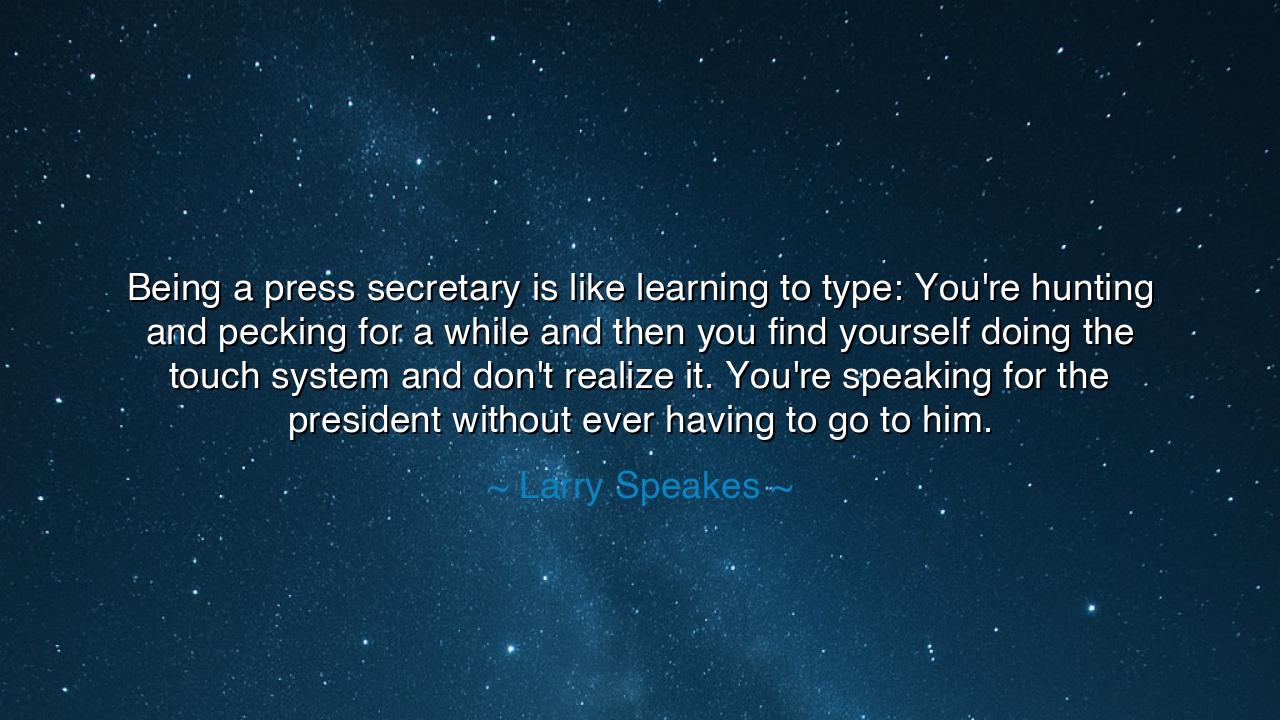
Being a press secretary is like learning to type: You're hunting
Being a press secretary is like learning to type: You're hunting and pecking for a while and then you find yourself doing the touch system and don't realize it. You're speaking for the president without ever having to go to him.






In a tone of wry wisdom born from experience, Larry Speakes once said, “Being a press secretary is like learning to type: You're hunting and pecking for a while and then you find yourself doing the touch system and don't realize it. You're speaking for the president without ever having to go to him.” At first, his words may seem lighthearted, even humorous, but beneath their surface lies a deep reflection on mastery, responsibility, and the delicate art of representation. In this single metaphor, Speakes captures the evolution of skill—the slow transformation from uncertainty to instinct, from imitation to intuition—and the immense trust that accompanies it when one speaks not for oneself, but for the highest office in the land.
The origin of this quote lies in Speakes’s own journey as the White House Press Secretary under President Ronald Reagan during the turbulent years of the 1980s. Thrust into the role after tragedy—the attempted assassination of President Reagan—Speakes found himself navigating both the media and the machinery of government with little preparation. Like a novice typist, he began by “hunting and pecking,” carefully choosing words, testing tone, and learning the rhythms of communication in a world where every syllable could move markets or shape history. Over time, his duties became instinctive; he found his voice merging with that of the administration, speaking not as an individual, but as the echo of power itself. His reflection, then, is both an acknowledgment of personal growth and a caution about the weight of one’s words when those words no longer belong solely to oneself.
To the ancients, such a transformation would have been recognized as a kind of apprenticeship of the soul. The philosopher Aristotle taught that virtue, like skill, begins in repetition and ends in instinct—that what is learned through practice becomes second nature. So it is with the press secretary, whose craft is not merely to convey facts, but to channel an institution’s will with precision and grace. Speakes’s metaphor of typing—mechanical yet mindful—reveals this duality: the merging of discipline and intuition, the evolution from clumsy effort to effortless fluency. But his final words, “speaking for the president without ever having to go to him,” remind us of a subtler danger: that mastery, if not grounded in humility, can drift into presumption.
History offers many examples of this balance between mastery and responsibility. Consider Marcus Tullius Cicero, the great Roman orator and statesman, who often spoke on behalf of the Republic before its Senate and people. His tongue was Rome’s mirror—eloquent, powerful, but also perilous. When Cicero’s words began to shape politics beyond his mandate, he found himself both revered and reviled, a servant of the state who had become its conscience. Like Speakes, he discovered that to speak for power is to walk a sacred line—one must learn to wield words as instruments of truth, not vanity. For the voice that represents another’s authority must never forget the trust upon which it stands.
Speakes’s analogy of “learning to type” also reflects a timeless truth about human growth: that expertise is not sudden, but gradual; not glamorous, but born of patience. The early clumsiness of the typist—the hunting, the pecking—mirrors every student’s struggle to find rhythm in chaos. But once mastery comes, the act becomes invisible, natural, seamless. So it is in every vocation, from the artisan at his craft to the teacher before her class. And yet, Speakes reminds us, with mastery comes a quiet peril—the risk of forgetting the sacredness of what we do, of losing awareness even as we gain ease. The typist who no longer looks at the keys must still remember the meaning of the words they form.
Beneath the humor of his comparison lies a profound reflection on trust. To be a press secretary is to hold a delicate covenant—to translate the mind of one man into the language of millions, to speak truth yet protect confidence, to serve both leader and nation. It is an act of stewardship as much as communication. In likening it to typing, Speakes hints that great power is often exercised not through grand gestures, but through the small, disciplined habits of daily effort. The true servant of leadership does not shout his importance; he serves with quiet precision, ensuring that the message, not the messenger, endures.
Let this be the lesson drawn from Speakes’s wisdom: that mastery in any field—be it language, leadership, or learning—begins with patience, humility, and repetition. The novice must not despise the awkward beginning, nor the master forget the reverence due to his craft. And above all, those who speak for others must remember that words, once given voice, become acts; they can heal or harm, enlighten or deceive. The tongue, like the hand upon the typewriter, must move with both skill and conscience.
So remember, children of words and duty: to learn is noble, to master is divine, but to serve with integrity is eternal. As Larry Speakes reminds us, the true art of representation lies not in speaking loudly, but in speaking faithfully—so that when we give voice to another’s vision, we do so not as echoes of ambition, but as instruments of truth.






AAdministratorAdministrator
Welcome, honored guests. Please leave a comment, we will respond soon